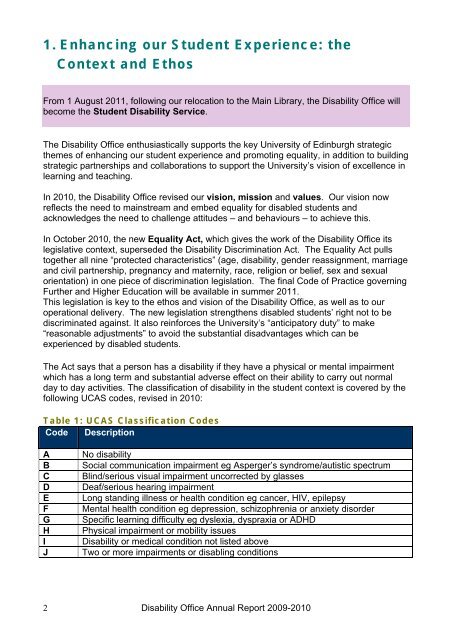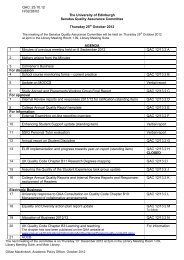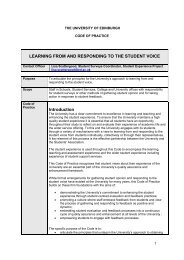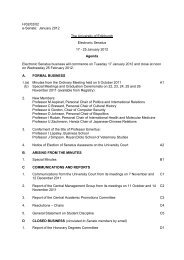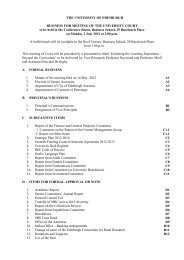Agenda and Papers - University of Edinburgh
Agenda and Papers - University of Edinburgh
Agenda and Papers - University of Edinburgh
Create successful ePaper yourself
Turn your PDF publications into a flip-book with our unique Google optimized e-Paper software.
1. Enhancing our Student Experience: the<br />
Context <strong>and</strong> Ethos<br />
From 1 August 2011, following our relocation to the Main Library, the Disability Office will<br />
become the Student Disability Service.<br />
The Disability Office enthusiastically supports the key <strong>University</strong> <strong>of</strong> <strong>Edinburgh</strong> strategic<br />
themes <strong>of</strong> enhancing our student experience <strong>and</strong> promoting equality, in addition to building<br />
strategic partnerships <strong>and</strong> collaborations to support the <strong>University</strong>’s vision <strong>of</strong> excellence in<br />
learning <strong>and</strong> teaching.<br />
In 2010, the Disability Office revised our vision, mission <strong>and</strong> values. Our vision now<br />
reflects the need to mainstream <strong>and</strong> embed equality for disabled students <strong>and</strong><br />
acknowledges the need to challenge attitudes – <strong>and</strong> behaviours – to achieve this.<br />
In October 2010, the new Equality Act, which gives the work <strong>of</strong> the Disability Office its<br />
legislative context, superseded the Disability Discrimination Act. The Equality Act pulls<br />
together all nine “protected characteristics” (age, disability, gender reassignment, marriage<br />
<strong>and</strong> civil partnership, pregnancy <strong>and</strong> maternity, race, religion or belief, sex <strong>and</strong> sexual<br />
orientation) in one piece <strong>of</strong> discrimination legislation. The final Code <strong>of</strong> Practice governing<br />
Further <strong>and</strong> Higher Education will be available in summer 2011.<br />
This legislation is key to the ethos <strong>and</strong> vision <strong>of</strong> the Disability Office, as well as to our<br />
operational delivery. The new legislation strengthens disabled students’ right not to be<br />
discriminated against. It also reinforces the <strong>University</strong>’s “anticipatory duty” to make<br />
“reasonable adjustments” to avoid the substantial disadvantages which can be<br />
experienced by disabled students.<br />
The Act says that a person has a disability if they have a physical or mental impairment<br />
which has a long term <strong>and</strong> substantial adverse effect on their ability to carry out normal<br />
day to day activities. The classification <strong>of</strong> disability in the student context is covered by the<br />
following UCAS codes, revised in 2010:<br />
Table 1: UCAS Classification Codes<br />
Code Description<br />
A<br />
B<br />
C<br />
D<br />
E<br />
F<br />
G<br />
H<br />
I<br />
J<br />
No disability<br />
Social communication impairment eg Asperger’s syndrome/autistic spectrum<br />
Blind/serious visual impairment uncorrected by glasses<br />
Deaf/serious hearing impairment<br />
Long st<strong>and</strong>ing illness or health condition eg cancer, HIV, epilepsy<br />
Mental health condition eg depression, schizophrenia or anxiety disorder<br />
Specific learning difficulty eg dyslexia, dyspraxia or ADHD<br />
Physical impairment or mobility issues<br />
Disability or medical condition not listed above<br />
Two or more impairments or disabling conditions<br />
2<br />
Disability Office Annual Report 2009-2010


